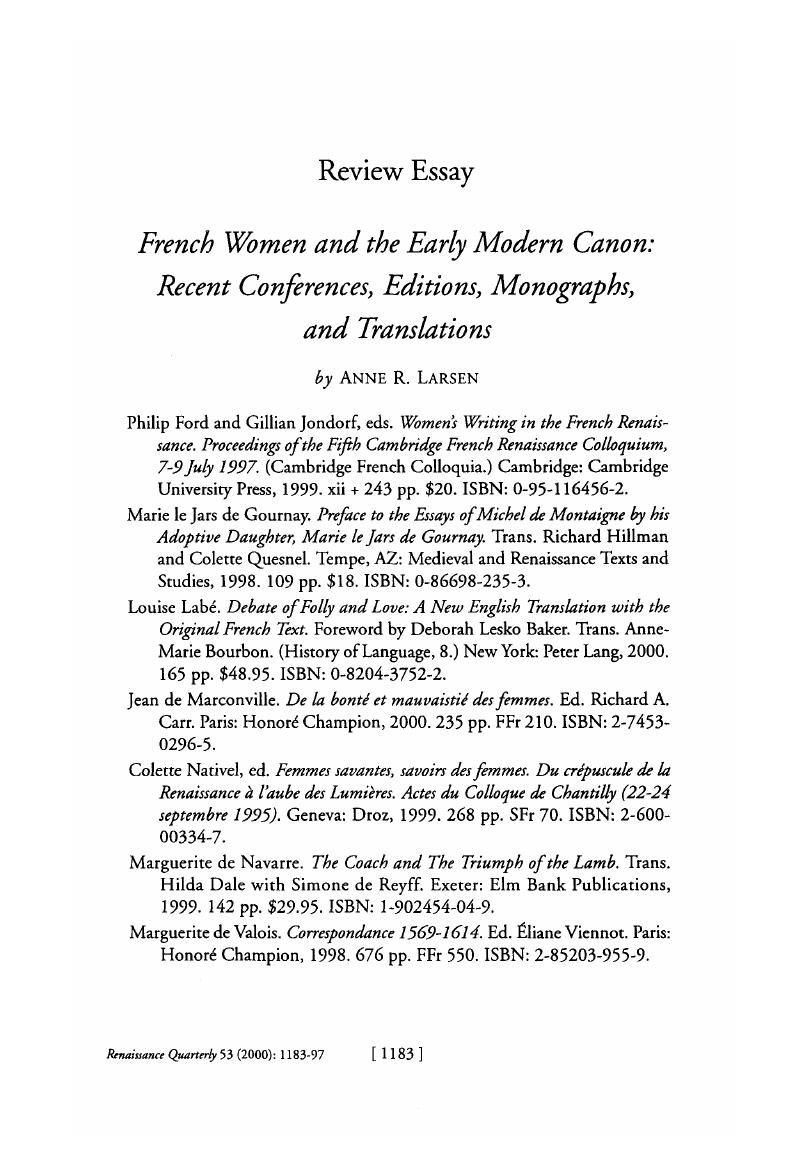No CrossRef data available.
Article contents
French Women and the Early Modern Canon: Recent Conferences, Editions, Monographs, and Translations
Review products
Published online by Cambridge University Press: 20 November 2018
Abstract

- Type
- Review Essays
- Information
- Copyright
- Copyright © Renaissance Society of America 2000
References
1 The earliest edition of Christine de Pizan's Tresor de la cite” des dames was printed in 1497; de Gournay's, Marie L'Ombre de la damoiselle de Gournay (Paris, 1626)Google Scholar had two further printings in 1634 and in 1641 under the title Les Advis, ou Us Presens de la Demoiselle de Gournay. All translations in this review are my own.
2 Evelyne Berriot-Salvadore, “La problématique histoire des textes feminins,” Atlantis 19 (1993): 9. Put another way, of the forty-six names ofwomen that appear in Francois La Croix Du Maine's Bibliotheque (Paris, 1584), only fifteen appear in print, while thirty-one are said to have left their writings in manuscript form; see Berriot-Salvadore, Les Femmes dans la sociiti francaise de la Renaissance (Geneva, 1990), 362.
3 The very first printed work by a woman in France is Pizan's translation Lart de chevalerie selon Vegece (Paris: Antoine Vérard, 1488); see Susan Broomhall, “French Women in Print, 1488 to 1599,” Bibliographical Society of Australia and New Zealand Bulletin 22 (1998): 195-231.
4 Moi, Toril, in Sexual/Textual Politics (London and New York, Methuen, 1985)Google Scholar, asks: “How did women manage to write at all, given the relendess patriarchal indoctrination that surrounded them from the moment they were born?” and suggests that “only a sophisticated account of the contradictory, fragmentary nature of patriarchal ideology” can help provide an answer (64).
5 The Brussels conference proceedings, under the same title as the conference, were edited by Michel Bastiaensen (Bruxelles: Peeters, 1997).
6 Other publishers have produced facsimile editions, such as Scholars’ Facsimiles and Reprints in Delmar, New York, or Côté-femmes Editions in Paris, which publishes lightlyannotated versions of texts with brief prefaces.
7 Cl.-G. Dubois, “Preface” to the conference proceedings Marguerite de France, Reine de Navarre et son temps. Actes du colloque d'Agen (12-13 octobre 1991), ed. M. Lazard and J. Cubelier de Beynac (Centre Matteo Bandello d'Agen, 1994), 10.
8 Louise Labé for example, has been the focus of three monographs since 1996: Deborah Lesko Baker, The Subject of Desire. Petrarchan Poetics and the Female Voice in Louise Labi (1996), Francois Rigolot, Louise Labi Lyonnaise, ou la Renaissance aufiminin (1997), and Daniel Martin, Signe(s) d'Amante. L'agencement des Euvres de Louize Labi Lionnoize (1999).
9 These include, so far, Christine de Pizan's debate over the Romance of the Rose, Marie Dentiere's epistles and History of the Deliverance of Geneva by Protestants, Marie de Gournay's Equality of Men and Women, Francois de La Barre's Equality of the Sexes and Education of Women, selections from the works of the Dames des Roches, and Madeleine de Scuddry's orations and rhetorical dialogues.
10 The base text of the translation is Francois Rigolot's 1989 edition and annotation of the 1995 Preface, published in Montaigne Studies, vol. 1.


